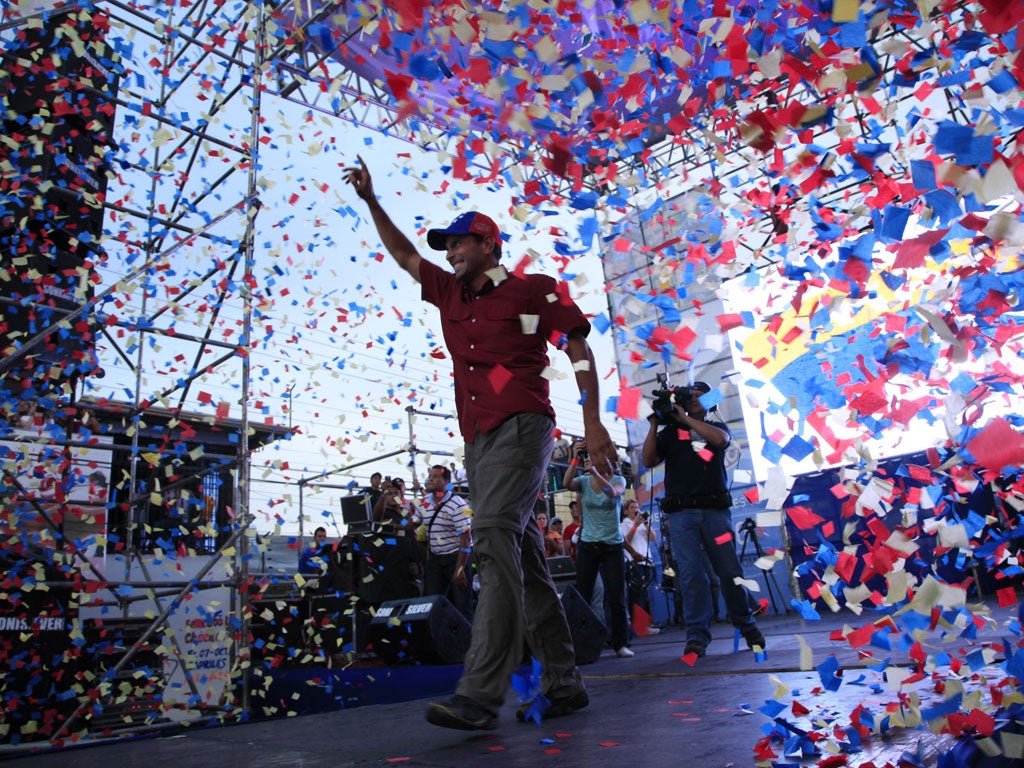Chavez rattled by heart-throb rival
Venezuela goes to the polls a week today, and a charismatic young leader is poised to end the President's 14-year rule

The crowds are bigger, his speeches slicker, and Venezuela's young opposition leader, Henrique Capriles, is on a roll in a final, frenzied push to end President Hugo Chavez's socialist rule. With just one week left before the Opec nation's presidential election, the 40-year-old state governor is whipping up crowds like never before, creeping up in the polls and becoming increasingly aggressive in his attacks on Chavez's policies.
"We've never had a candidate like him," gushes shopkeeper Andrea Gomez, 42, screaming at Capriles like a teenage fan at a pop concert, as the passing politician blows kisses from an open-top cavalcade on the Caribbean coast north of Caracas.
Capriles has made big inroads among the working class where Chavez has his power-base, but still faces suspicions that he is too much of a rich kid and will end Chavez's popular welfare programmes.
The 58-year-old incumbent remains a formidable campaigner and has a strong connection with many Venezuelans, especially the poor. Yet while a majority of big pollsters still put Chavez in front, two – Consultores 21 and Varianzas – have Capriles just ahead.
Opposition activists insist the poll numbers are distorted by a "fear factor" – government employees wary of reprisals if they show support for Capriles, for instance – and therefore underestimate their man's real popularity. Either way, Capriles seems certain to have the best tilt at Chavez that anyone has managed during his 14-year rule.
Criss-crossing the country for most of 2012, the business-friendly law graduate first won an opposition primary with ease and has been gathering steam, and honing his style, ever since. A devout Catholic, he has based his strategy on a "house-by-house" tour, from remote Amazon villages and Andean highlands to cattle ranches and city slums. Dashing around by bus and plane, he typically visits three or four places a day, often joining in basketball games, highlighting his youth and energy. He bears scratches from female admirers grabbing at him in the crowds, downs Red Bulls to keep his energy up, and has earned the affectionate nickname El Flaquito (Skinny).
Lately, he has been going for Chavez's jugular. When the President begins one of his hours-long speeches, his rival sometimes tweets mocking ripostes. In the past week, he has been waving Chavez's manifesto while scoffing at its pledges to "save mankind" and strive for a "new international geopolitic" dynamic. "But who takes care of the electricity cuts?" he asked last week, homing in on one of the subjects dear to voters, who also worry about high crime rates, rising prices and lack of jobs.
Though Capriles's campaign has momentum, Chavez retains his charismatic, folksy rhetoric, and state media ensure he gets blanket coverage.
And then there's the money. A ramping up of spending on social welfare is guaranteed to win votes, while state institutions have barely concealed their use of official resources to support Chavez. Capriles's own, cheaper, campaign relies on donations and fundraising by supporters. Some wealthy Venezuelan businessmen and exiles are also thought to be helping.
Capriles says he trusts the president to step down if he loses. Yet more radical opposition activists claim, without offering evidence, that Chavez would do anything to stay in power, from vote-rigging to sending armed supporters into the streets. While there are no official international monitors for the 7 October poll, the Unasur group of South American nations is sending observers. Capriles's Democratic Unity coalition will place witnesses at almost all the voting booths, as will the government. But many analysts say government spending during the campaign is likely to be a bigger factor than any potential fraud.
Join our commenting forum
Join thought-provoking conversations, follow other Independent readers and see their replies
Comments
Bookmark popover
Removed from bookmarks